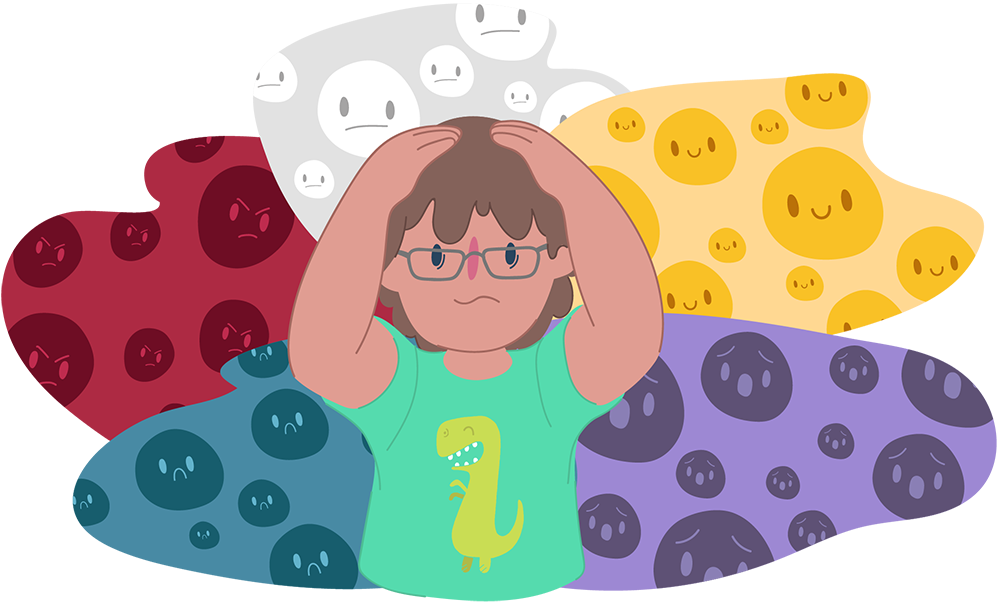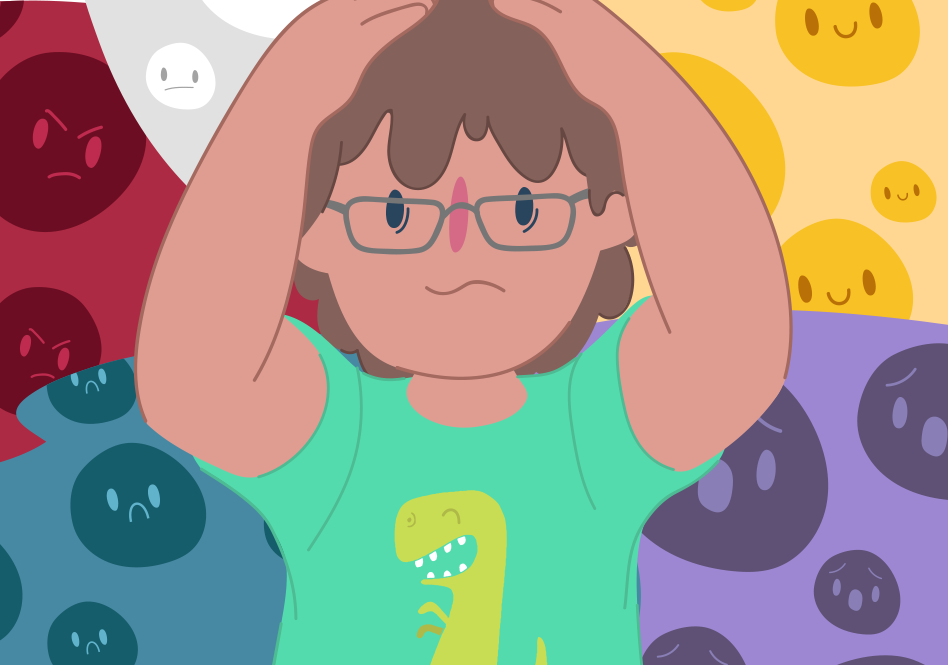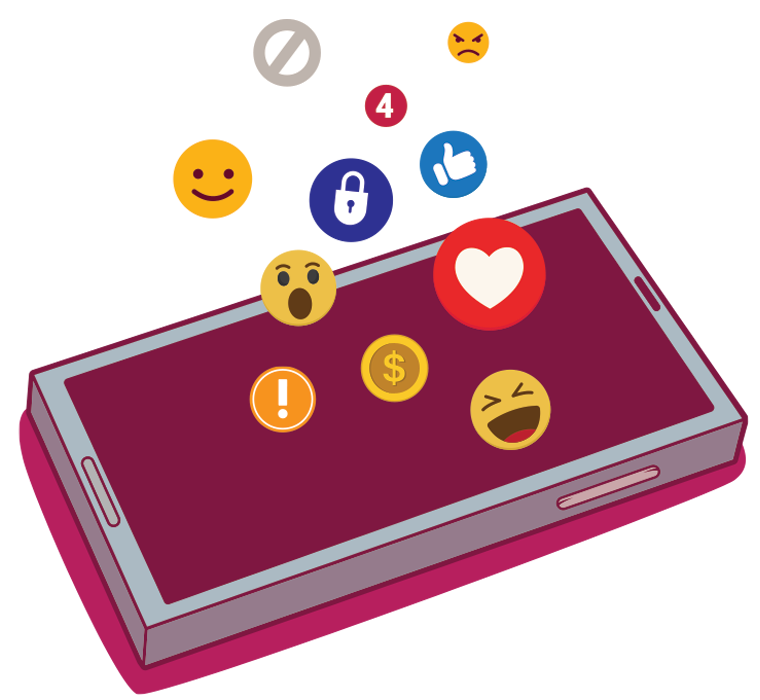Coping with emotions
Sometimes emotions can feel great, but sometimes they’re uncomfortable or even painful. Whether you’re feeling angry, sad, frustrated, lonely, or anxious, it’s important to have some healthy ways to cope with feelings that aren’t so fun.

Coping with emotions
Sometimes emotions can feel great, but sometimes they’re uncomfortable or even painful.
Whether you’re feeling angry, sad, frustrated, lonely, or anxious, it’s important to have some healthy ways to cope with feelings that aren’t so fun.
What are emotions?
Our brain is constantly taking in information about the world around us through our senses. Things we see, hear, touch, etc., all send info to our brainstem (or survival brain).
To process this info, our brainstem is connected to and communicates with our limbic system (or emotional brain). Our emotional brain attaches emotions to the sensory info we receive.
Why do we have emotions?
Emotions do a few different things for us. They:
- Helps us understand info our body receives (through your senses) about the world around us. E.g. You see a dog growling at you (sensory info). You feel frightened (emotional info – letting you know, “This is dangerous”.)
- Communicate and connect with others (through empathy or understanding each other’s emotions). E.g. Your friend starts crying. You understand they feel sad – and you know how that feels because you’ve felt sad before.
- Behave. They help us figure out how we should react/respond (i.e. our behaviour) in different situations. E.g. Someone bumps into you and accidentally knocks your iphone out of your hand. You feel irritated and like you might want to have a go at them – but they apologise. You decide to smile and say, “No problem” (behaviour).
- Meet our needs. We all have similar needs – we need connection with others, safety, freedom, purpose, fun, and a sense of accomplishment. Emotions are often a warning sign that a need isn’t getting met. E.g. Something unfair happened and you feel angry. You have a need for fairness.
Are emotions and feelings the same thing?
Emotions are the brain chemicals, while ‘feelings’ are the meaning, thoughts and behaviours we attach to emotions. Here’s how it works:
Situation > Emotions > Thoughts <> Feelings > Behaviours
We can’t always control the situation we’re in – and our emotions are automatic. But how we think about our emotions (i.e. our ‘feelings’) allows us to act or behave in different ways. How we think about a situation can also affect our emotions/feelings.
For example:
- Situation: Your friend leaves you on read after you said something super important.
- Emotions: You feel annoyed and a bit hurt.
- Thoughts: You start to wonder why they left you on read. You start overthinking about what that could mean. Do they not care? Do they hate you now? Are they ghosting you?
- Feelings: You start to feel more and more anxious.
- Behaviours: You send two or three panicked texts.
Side note: If you change your thoughts, you can change your feelings and behaviours. E.g., You think, “I know my friend cares. Maybe they’re busy right now. I still feel a bit annoyed about them not replying straight away – but I’m going to give them the benefit of the doubt and wait two hours before I send another message.”
Counselling – which we do here at Kids Helpline, is all about having insight into and changing your thoughts – because this influences your behaviours and your feelings.
Different emotions mean different things
Emotions communicate with us and help us figure out what we need. Here are some examples:
Is it stress, worry or anxiety?
Anxiety is a slightly more complex emotion, and it's made up of three things.
Stress: is your body’s response to possible danger (real or imagined). Stress is a physical response and can involve both fear and anger (fight and flight response), as well as some other emotions.
Worry: is your thinking response. It’s your brain’s way of trying to ‘solve the problem’.
Anxiety: happens when you have both stress (a body response) and worry (a thought response) at the same time. Anxiety is also when it doesn’t match the environment – so you feel unsafe/in danger, but you’re actually physically safe (aka a ‘false alarm’).
Thinking about emotions
How we interpret emotions – and how we behave – is heavily influenced by what we think about them. This includes our past experiences and our beliefs about ourselves.
There are some different thinking patterns/styles that we can get stuck in – and these thinking patterns can be unhelpful for us. Here are some examples:
- All or nothing thinking. Thinking in extremes with no 'grey area', e.g. "If I don't come first place, then I'm a total loser."
- Only seeing the negatives. Filtering out or minimising the positive or ok bits and only remembering or focusing on the bad bits. E.g. "It's my fault we lost – I missed that goal in soccer!"
- Overgeneralising. Applying one outcome across all situations, e.g. "I never do well at math, I always suck!” (Using words like always, never, all and every).
- Thinking all feelings are true all of the time. E.g. "I feel this way because something bad is going to happen." All emotions are valid, but not all emotions are true.
- Jumping to conclusions. 'Mind reading', e.g. "They think I'm a loser" or 'fortune telling', e.g. "I'm going to make a fool of myself."
- Taking things personally. Blaming yourself for stuff you can't control. E.g. "It's all my fault my friend got in trouble for doing the wrong thing."
- Catastrophising. Blowing things out of proportion or thinking the worst-case scenario. E.g. "If I do badly on this assignment, I will never get my dream job."
Managing your emotions
Learning to manage emotions – also known as ‘emotional self-regulation', takes time and practice.
How we learn to deal with emotions is strongly influenced by the people around us – especially our family and friends.
Unfortunately, sometimes the people in our lives don’t know how to manage their emotions or they manage their emotions in ways that are harmful to themselves and others.
The good news is that anyone can learn new, different and helpful ways of managing emotions. Here are some great things you can try.
‘Name to tame’
Being able to recognise and name your emotions can help you understand them. Once you understand the emotion, you have more control over your thoughts and behaviours, and you can have deeper insight into yourself, your needs, and your relationships.
Be curious about your emotions
Emotions are automatic, so it’s important not to beat yourself up (blame or shame yourself) for your emotions. There’s no such thing as a ‘bad’ emotion.
They’re communicating a need with you. Ask yourself, ‘What is this emotion telling me? What do I need right now?’
Process emotions
Sometimes we get stuck with emotions. Getting creative can help you process what you’re feeling. Things like drawing, writing, music, dance and storytelling can all help you express your emotions creatively. These activities help you connect with your ‘thinking brain’ (neocortex) as well.
Delay behaviours
Practice taking some time and space to think about your emotions before acting on them – because our limbic (emotional) brain can sometimes make very emotional decisions we regret.
We need to respond/react from a place of calm – so our neocortex (‘thinking brain’) can help us behave in ways that are helpful/good for us (and our ‘thinking brain’ can sometimes switch off temporarily when we feel a strong emotion).
Think critically about your thoughts and feelings
This is especially important if you find yourself getting stuck in negative thought patterns. You can put your thoughts on the ‘witness stand’ by asking, “Is this thought helpful? Is it realistic?”
You can also ‘reframe’ negative thoughts, by thinking of an ‘upside’. E.g. “I have no friends at my new school. But it’s also a chance to make some new friends.”
You can also get support to talk it through and make an action plan if needed, too.
You can delay a behaviour by doing something that helps you feel calm or using a distraction. Remember that you are in control of your behaviour.
There’s always something you can try or somebody you can talk to
While it’s good to work on some things that can help you cope, you don’t have to face this alone.
If you need support to find ways to express your emotions in a positive way, call us, start a WebChat or send an email today.
If you need more information for other digital services and resources, check out Head to Health.
Check these out too:
Expressing your feelings
Expressing how you feel can help you cope when life throws you ...
READ MEFeeling sad and depression
Feeling sad is not the same as being depressed. Sometimes it’s ...
READ MEWhy do I freak out when I’m stressed?
To work out why you're feeling anxious, it can be really helpful ...
READ MECoping strategies
If you are feeling stressed, anxious or just struggling to deal, there ...
READ ME
Talking helps! We’re here for you.
No problem is too big or too small.
We're here 24 hours a day, 7 days a week







